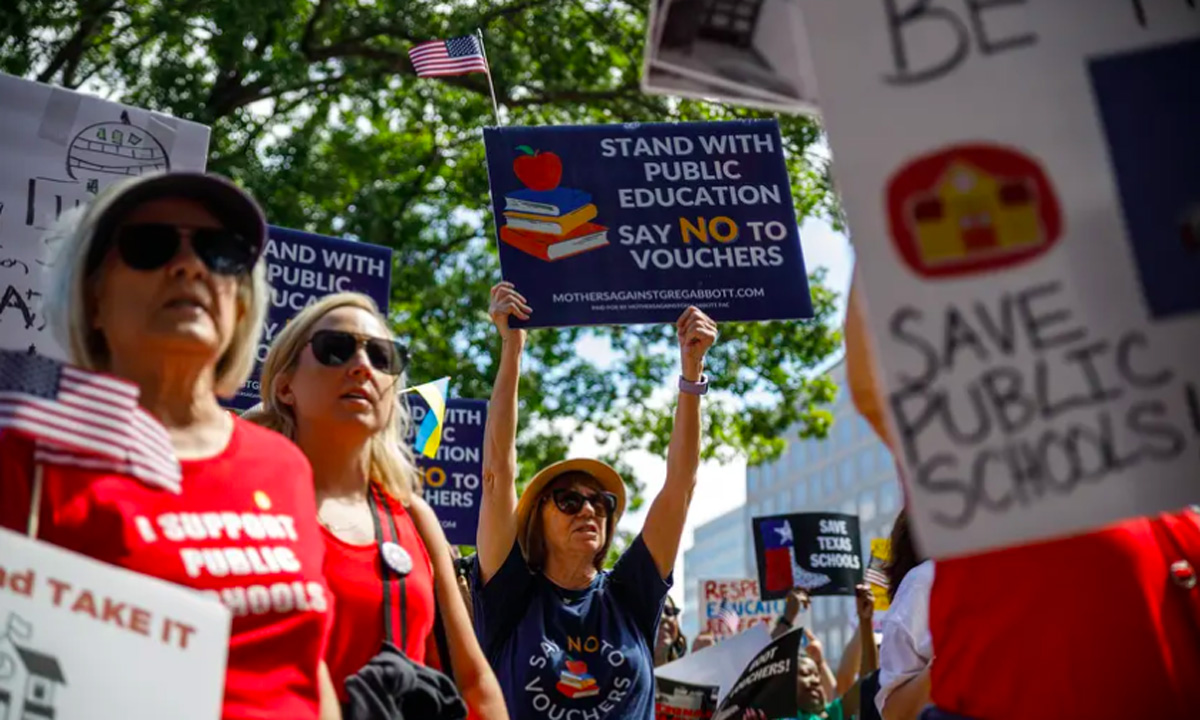Texas Senate Unveils its Priority School Voucher Bill
The proposal would give families who exit the state’s public ed system access to $8,000 of taxpayer money each year to pay for private schooling.

Get stories like this delivered straight to your inbox. Sign up for The 74 Newsletter
The Texas Senate unveiled Monday its main bill to establish an education savings account program, a priority for Gov. Greg Abbott this special session.
Senate Bill 1, authored by Sen. Brandon Creighton, R-Conroe, would allow families access $8,000 of taxpayer money to pay for private schools and other educational expenses such as uniforms, textbooks, tutoring or transportation among other things.
“Educating the next generation of Texans is a fundamental responsibility, and it is my belief that empowering parents with school choice will encourage competition, innovation and ensure that every student in Texas has the opportunity to find an educational path for their unique needs,” Creighton said in a statement.
The state comptroller’s office would establish and administer these education savings accounts. The bill seeks to allocate $500 million from the general revenue fund for the next two years to pay for the program. The comptroller’s office would also be in charge of preventing fraud and misuse of funds — a major area of concern for many lawmakers — as well as approving an organization to help process applications and approve vendors and participating private schools.
Creighton says that the program will not siphon money away from public schools as the funding comes from general revenue, not the Foundation School Program, which is the main source of funding for the state’s K-12 public schools.
The bill does not require private school students to take a state-administered academic achievement exam, something that school voucher critics in the Texas Legislature have said an education savings account proposal should have to even consider it.
If passed into law, almost any student who was enrolled in a public school last year would be eligible to apply for the program, as well as any student ready to enroll in Pre-K or kindergarten.
The bill includes a formula to prioritize entry to the program if there are more applicants than funds available. Forty percent of open spots would go to students who receive free or reduced lunch; 30% to families who earn between 185% and 500% of the federal poverty line; 20% to those with disabilities; and 10% to those who attended public, private or home-school in the last school year.
The filing of SB 1 came hours after Creighton announced Senate Bill 2, a $5.2 billion school funding bill that would allocate most of the money to teacher raises and include a small funding increase to help schools pay their rising bills.
It remains to be seen whether the funding bill can even move forward. The only education-related item in Abbott’s agenda for the special session was education savings accounts, a school voucher program that would give families access to state funds to pay for their children’s private schooling. The state constitution says lawmakers can only pass bills related to the governor’s agenda items during special sessions. The governor can at any time modify the agenda.
Creighton said SB 1 and SB 2 work in tandem and show that lawmakers can provide more schooling options for Texas families while also adding public school funding. During the regular session, two proposals to create an education savings account program and give teachers pay bonuses, also authored by Creighton, fizzled in the House amid disagreements over vouchers and how to give teachers raises.
In a Hail Mary play at the end of the regular session, Creighton attached his education savings account proposal — similar to the one he announced Monday — to House Bill 100, a school finance bill. That bill eventually died after House members once again stood firm against school vouchers, though the move left public schools with no new funding for teacher raises and other rising expenses.
The future of an education savings account program remained uncertain as this year’s third special session started Monday with Texas Republicans embroiled in intraparty fighting. Lt. Gov. Dan Patrick called on House Speaker Dade Phelan to resign because the speaker demanded he return $3 million to a major backer, the Defend Texas Liberty PAC, after The Texas Tribune reported its leader had met with a white supremacist and antisemitic activist. Patrick accused Phelan of using this weekend’s Hamas attack on Israel for political gain.
Meanwhile, Texas House Democrats signaled their intent to once again stand against any kind of school voucher program.
Rep. Trey Martinez Fischer of San Antonio, chair of the House Democratic Caucus, told reporters his group is “very clear: no vouchers and no deals.”
“A voucher scam is a poison pill that will end up taking more out of our public schools than it puts in,” said Rep. James Talarico, D-Austin.
Mark Jones, a political science professor at Rice University, said he believes Abbott and the Senate are on the same page when it comes to public school funding and school vouchers.
SB2 “is the main carrot Abbott is using to entice the anti-voucher Republicans and the small number of persuadable Democrats to vote for school choice legislation,” Jones said. “The quid-pro-quo is that once school choice legislation is en route to the governor’s desk, Abbott will place public school funding on the special session agenda, thereby allowing the Senate and House to quickly pass SB2 or a comparable House bill.”
This article originally appeared in The Texas Tribune, a member-supported, nonpartisan newsroom informing and engaging Texans on state politics and policy. Learn more at texastribune.org.
Disclosure: Rice University has been a financial supporter of The Texas Tribune, a nonprofit, nonpartisan news organization that is funded in part by donations from members, foundations and corporate sponsors. Financial supporters play no role in the Tribune’s journalism. Find a complete list of them here.
Get stories like these delivered straight to your inbox. Sign up for The 74 Newsletter

;)